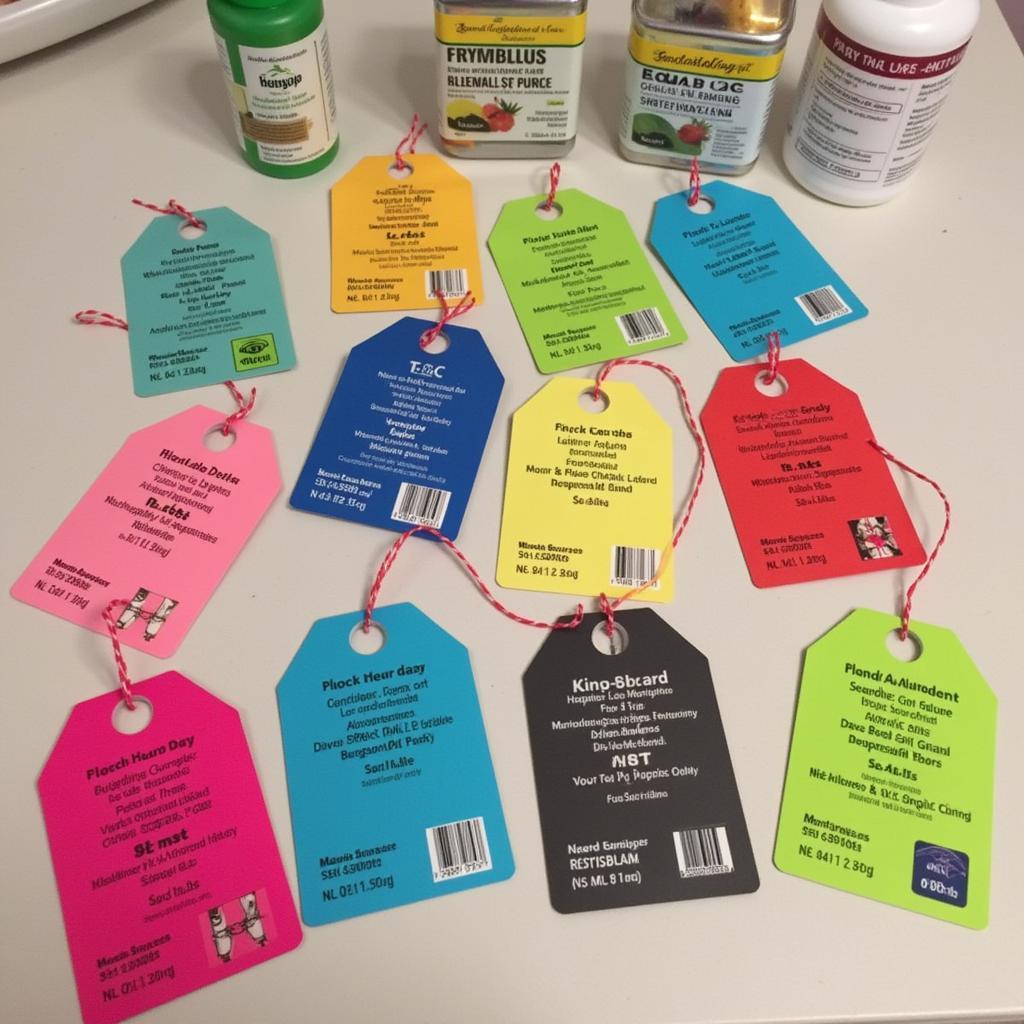Fly Tags For Horses are a popular fly control method, offering a convenient and often cost-effective way to protect your equine companion from pesky insects. But are they truly effective, and what are the important factors to consider when choosing and using them? This comprehensive guide will delve into everything you need to know about fly tags for horses, from understanding their mechanism of action to exploring the different types available and ensuring their safe and effective use.  Horse wearing a fly tag
Horse wearing a fly tag
Understanding How Fly Tags Work
Fly tags for horses typically contain insecticides that are slowly released over time. These insecticides work through contact, meaning the flies must land on the horse and come into contact with the tag or the insecticide residue on the horse’s coat to be affected. The active ingredients in fly tags can vary, with some targeting a broader range of insects while others focus on specific pests.
Different Types of Fly Tags
There are several types of fly tags available, each with its own advantages and disadvantages. Some common types include:
- Permethrin tags: These tags contain the synthetic pyrethroid permethrin, which is effective against a wide range of flies, mosquitoes, and ticks.
- Organophosphate tags: These tags contain organophosphates, which are also effective against a broad spectrum of insects. However, they can be more toxic than pyrethroids and should be used with caution.
- Natural fly tags: These tags utilize natural ingredients like essential oils to repel flies. While generally considered safer, their effectiveness can vary.
Choosing the Right Fly Tag for Your Horse
Selecting the appropriate fly tag involves considering various factors, such as:
- Target pests: Identify the specific insects that are problematic in your area. Some tags are more effective against certain pests than others.
- Sensitivity of your horse: Some horses may be more sensitive to certain insecticides. If your horse has sensitive skin, consider using natural fly tags or consulting with your veterinarian.
- Duration of effectiveness: Fly tags have varying lifespans. Consider how long you need the protection to last and choose a tag accordingly.
Applying and Using Fly Tags Safely
While fly tags are generally safe, it’s crucial to follow the manufacturer’s instructions carefully. Some important safety tips include:
- Wear gloves when applying: This prevents direct contact with the insecticide.
- Avoid contact with eyes and skin: If accidental contact occurs, rinse thoroughly with water.
- Dispose of used tags properly: Follow local regulations for disposing of hazardous waste.
Integrating Fly Tags with Other Fly Control Methods
Fly tags are often most effective when used as part of an integrated pest management strategy. Consider combining them with other fly control methods, such as:
- Fly sprays: what is the best fly spray for horses can offer immediate relief from flies and provide additional protection.
- Fly masks: A horse with fly mask can protect the horse’s sensitive eyes and face from flies. Check out our guide to the best fly masks for horses.
- Fly control supplements: fly control supplement horses can help deter flies from the inside out.
- Environmental management: Regularly cleaning stalls and removing manure can help minimize fly breeding grounds. Have you considered cattle fly tags for horses?
 Different types of fly tags for horses
Different types of fly tags for horses
Are Cattle Fly Tags Safe for Horses?
Many horse owners wonder if they can use cattle fly tags on their horses. While it might seem economical, it’s generally not recommended. Cattle fly tags are formulated for cattle and may contain higher concentrations of insecticides that could be harmful to horses.
Expert Insight: Dr. Emily Carter, DVM, Equine Veterinarian, advises, “While the temptation to use cattle fly tags might be strong due to cost, it’s crucial to stick to equine-specific products. The formulations are different, and using cattle tags on horses could lead to adverse reactions.”
Conclusion
Fly tags for horses can be a valuable tool in your fly control arsenal, providing convenient and relatively long-lasting protection. By carefully choosing the right type of tag, applying it correctly, and integrating it with other fly control methods, you can effectively minimize the impact of flies on your horse’s comfort and well-being. Remember to prioritize your horse’s safety and consult with your veterinarian if you have any concerns.
FAQ
- How long do fly tags typically last? The lifespan of a fly tag varies depending on the brand and type, generally lasting from a few weeks to several months.
- Can I use multiple fly tags on my horse? While it’s generally not necessary, you can use multiple tags if you’re dealing with a severe fly infestation. However, consult with your veterinarian first.
- Are fly tags waterproof? Most fly tags are designed to withstand some exposure to rain and moisture, but their effectiveness may be reduced with prolonged exposure.
- What should I do if my horse has a reaction to a fly tag? Remove the tag immediately and contact your veterinarian.
- Can I use fly tags on foals? Consult with your veterinarian before using fly tags on foals, as they may be more sensitive to insecticides.
- Are there natural alternatives to fly tags? Yes, natural fly sprays and essential oil-based repellents can be used as alternatives.
- Where should I attach the fly tag on my horse? The most common placement is on the mane, but you can also attach it to the tail or other areas of the horse’s coat.
Need help with other horse care challenges? Check out our articles on various topics, including fly control, hoof care, and nutrition.
For further assistance, don’t hesitate to contact us. Call: 0772127271, Email: [email protected] Or visit us at: QGM2+WX2, Vị Trung, Vị Thuỷ, Hậu Giang, Việt Nam. We have a 24/7 customer service team.